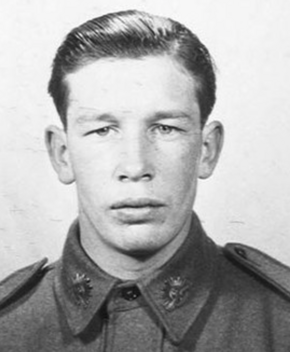
RADCLIFFE, Keneth Edward
| Service Number: | VX20450 |
|---|---|
| Enlisted: | 31 May 1940 |
| Last Rank: | Private |
| Last Unit: | 2nd/2nd Pioneer Battalion |
| Born: | Richmond, Victoria, Australia, 17 August 1919 |
| Home Town: | Prahran, Stonnington, Victoria |
| Schooling: | Not yet discovered |
| Occupation: | Machinist |
| Died: | Illness, Borneo, 28 September 1944, aged 25 years |
| Cemetery: |
No known grave - "Known Unto God" Labuan Memorial, Panel 19. Malaysia |
| Memorials: | Australian War Memorial Roll of Honour, Ballarat Australian Ex-Prisoners of War Memorial, Bendigo Sandakan Prisoner of War Memorial |
World War 2 Service
| 3 Sep 1939: | Involvement Private, VX20450 | |
|---|---|---|
| 31 May 1940: | Enlisted Australian Military Forces (WW2) , Private, VX20450, 2nd/2nd Pioneer Battalion | |
| 16 Feb 1942: | Imprisoned Malaya/Singapore, Died of malaria and beriberi in Japanese captivity at Sandakan POW camp |
Help us honour Keneth Edward Radcliffe's service by contributing information, stories, and images so that they can be preserved for future generations.
Add my storyBiography contributed by Ian R SMITH
Ken spent about six months on Java in various Japanese prisoner of war camps, were then sent to Singapore, and three weeks after his arrival he embarked on a transport with an almost entirely British group on 9 October 1942, to be split between Japanese-occupied Kuching in Sarawak and Jesselton (now Kota Kinabalu) in British North Borneo, both now part of Malaysia. After unloading about 1,000 British prisoners at Kuching, Ken and 826 other prisoners were disembarked at Jesselton on 19 October after a terrible voyage. They were jammed into the Victoria Gaol which usually held a maximum of 40 prisoners, and were mainly accommodated in leaky atap huts erected within the walls.
Conditions were very poor. In April 1943, after 48 prisoners had died, the Japanese transported the prisoners to Sandakan camp on the north-eastern tip of Borneo. There they built a second camp near that of the first group of Australians sent from Singapore in July 1942, but were kept apart of the men in the first compound. In June 1944, Ken and two other Australians were transferred to Labuan Island off the northern coast of Borneo along with one British officer and 96 British prisoners. They were initially held in a compound on the grounds of the Victoria Golf Club near the harbour, but after it was bombed, they were moved to a new compound three miles inland. They were employed constructing an airfield. In August they were joined by another 200 prisoners from Kuching, of whom only two were Australians. Between September and December 1944, more than a third of the prisoners on Labuan died of malaria, worsened by the lack of food provided by the Japanese.
One of those men was Ken Radcliffe, who died of malaria and beriberi on this day in 1944 while in Japanese captivity on Labuan, aged 25. He was presumably buried near the camp, but after the war the Australian Army Graves Service disinterred all the remains and reinterred them at Labuan War Cemetery. Like many of the dead at Labuan, Ken’s individual grave position is unknown, so his name is inscribed on the Labuan Memorial.










